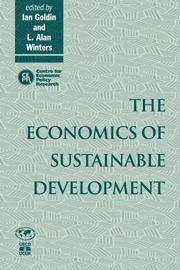Book contents
1 - Economic policies for sustainable development
Published online by Cambridge University Press: 04 August 2010
Summary
Is growth sustainable?
Sustainable development has come to the top of the international and domestic policy agendas. However, while the notion of ‘sustainability’ is widely accepted, its precise content has remained elusive. ‘Sustainable development’ is often defined as development that meets the needs of present generations without compromising the ability of future generations to meet their needs. This and similar definitions of sustainable development underline the intergenerational responsibilities placed on the earth's inhabitants. However, the concept of needs is one of the most complex in economics, and to imbed it in the definition of sustainability is to make intractable an already complex definition. Accordingly, it is necessary to narrow the definition of sustainable development to refer to an economy in which future growth is not compromised by that of the present.
This volume examines the economics of sustainable development. It is concerned with the interaction of economic policies, growth and the environment: in particular with the question: is growth sustainable? The volume draws on economic theory to provide fresh perspectives on this issue. It provides an indication of the ‘state of the art’ in the economic analysis of sustainability issues, and then extends the economic literature by stretching the theory to incorporate sustainability issues. In line with our comparative advantage and to keep the volume manageable, however, we confine ourselves to the interface of economic theory and sustainability, and thereby neglect a range of elements which are integral to sustainable development. These include considerations of equity, gender, education, civil rights, culture and other aspects of human development.
- Type
- Chapter
- Information
- The Economics of Sustainable Development , pp. 1 - 16Publisher: Cambridge University PressPrint publication year: 1995
- 3
- Cited by



